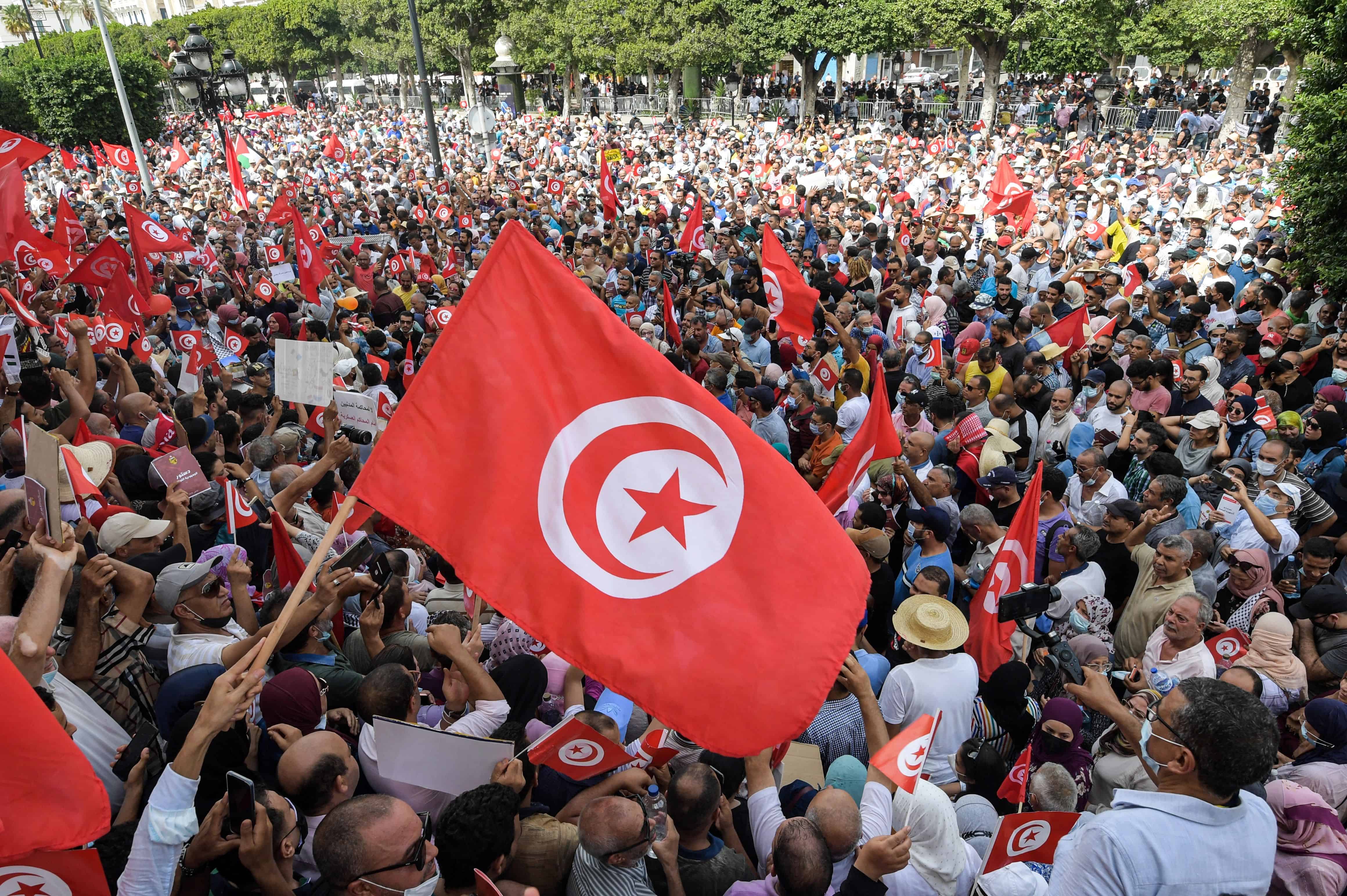Rival Tunisian demonstrators rallied for and against President Kais Saied on Friday, December 17, as the country marks the anniversary of a revolution that sparked the 2011 Arab uprisings but failed to resolve deep economic and social woes.
Saied in July sacked the government, froze parliament and seized far-reaching powers, vowing to hold his “corrupt” political rivals to account.
On Monday, the former constitutional law lecturer prolonged his suspension of parliament until elections in December 2022 and announced a nationwide public consultation to draw up a new constitution.
In response, nearly 1,000 people gathered at a key junction in central Tunis on Friday, chanting slogans against Saied’s “coup d’etat”.
Metal barriers and dozens of security personnel separated them from some 200 Saied supporters who rallied nearby, chanting “the people want the corrupt to go on trial”.
The president’s Islamist-inspired opponents Ennahdha and other lawmakers have bitterly opposed Saied’s moves.
But many Tunisians tired of a system seen as graft-ridden and ineffective have welcomed them.
Standing with other demonstrators on Habib Bourguiba Avenue, the epicenter of Tunisia’s revolution, Nacer Medjbari said he had come from the central city of Kairouan to voice support for “putting the revolution back on the right path”.
“We want a democratic system that comes from the people,” he told AFP.
‘Power grab’
Friday marks 11 years since street vendor Mohammed Bouazizi set himself alight in the marginalized town of Sidi Bouzid, sparking a four-week revolt that forced veteran dictator Zine El Abidine Ben Ali from power.
Saied earlier this month moved the official anniversary of the revolution from January 14 — the date Ben Ali fled into exile — to December 17.
On Friday, Saied congratulated the Tunisian people with a tweet saying “the process (of the revolution) must continue within state institutions and through legislation enabling people to regain their rights to work, freedom and national dignity”.
But in Sidi Bouzid, activist Lasaad Bouazizi dismissed Saied’s moves.
“We didn’t have a revolution so Kais Saied could take control of everything,” the 53-year-old said. “He’s not the chief of the revolution.”
Fellow resident, teacher Boubaker Gassoumi, welcomed Saied’s latest moves but said the country’s rulers since Ben Ali had done nothing for Sidi Bouzid.
“Nothing has changed since December 17, 2010,” he said. “All the political parties that have ruled since the revolution and signed secret deals, they’re the reason the revolution failed.”
‘It’s not right’
Saied has repeatedly blamed unnamed corrupt politicians for the revolution’s failure, and has repeatedly proposed changing the 2014 constitution, which enshrined the parliamentary-presidential system he says enabled them.
In Tunis, anti-Saied demonstrator Abdelkrim Lacha, a retired auditor, rejected the idea.
“A constitution was already written and voted by more than 200 MPs,” he said.
“Now they’re telling us that it wasn’t good, and it’s going to be re-written by three or four academics. It’s not right.”
Abdellatif Mekki, a former senior Ennahdha official, told AFP that Saied had “grabbed power for another year, with an agenda that makes no sense”.
According to Youssef Cherif of the Columbia Global Centers for North Africa, most Tunisians have shown little interest in the latest announcements while the opposition is “weak and divided”.
“There’s an active minority that voiced its discontent and will continue to protest” against Saied’s moves, he told AFP.
“But most of the population… are looking elsewhere, at least for now.”
‘Black decade’
For many Tunisians, the most pressing issue is the economy, which is creaking under high inflation, debt close to 100 percent of GDP and 18 percent joblessness, exacerbated by the coronavirus pandemic.
“We’ve lived through a black decade of hunger and impoverishment,” said pro-Saied demonstrator Medjbari.
“All the economic indicators are down and unemployment has quadrupled.”
Talks with international donors for a fourth bailout package in a decade remain suspended and worries are mounting that Tunisia could default on its sovereign debt, yet Saied has prioritized rewriting the constitution.
Cherif warned that said Saied “doesn’t have an economic plan to speak of”.
“Who is going to finance this long transition and how are the country’s savings going to be managed in the coming months? Once again, uncertainty reigns,” he said.
The envoys of seven Western states plus the European Union had last week urged Tunisia to respect “fundamental freedoms” and set a timeline for a return to democratic institutions.
On Thursday, the European Council welcomed Saied’s roadmap as “an important step towards restoring institutional stability and balance”.
But jobless Sidi Bouzid resident Hamza Hajlaoui told AFP that neither Ennahdha, Saied or any political party could change the country.
“There’s no hope, not today, nor tomorrow nor the day after,” he said. “The only thing that works today is to leave the country.”

